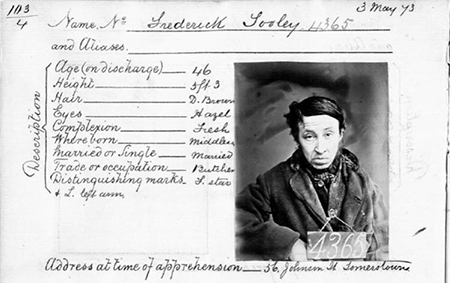The Digital Panopticon: The Global Impact of London Punishments (1780-1925)
Using digital technologies to trace the lives of British and Australian convicts.
Started in 2013, The Digital Panopticon is a collaborative project between the Universities of Liverpool, Sheffield, Tasmania, Oxford and Sussex, led by Professor Barry Godfrey from the University of Liverpool Sociology, Social Policy and Criminology Department. This £1.7million AHRC project has made it possible for people to trace the records of Londoners sentenced to either imprisonment or transportation from 1787 up to the 1920s when the last convict died.

The project used digital technologies to bring together existing and new genealogical, biometric and criminal justice datasets held by different organisations in the UK and Australia. It explores the impact of the different types of penal punishments on the lives of 66,000 people sentenced at The Old Bailey between 1780 and 1875. The team is also developed new and transferable methodologies for understanding and exploiting complex bodies of genealogical, biometric, and criminal justice data and create a searchable website.
Professor Barry Godfrey commented: “This project will, for the first time, make it possible to chart the fortunes of all prisoners from London who were transported to Australia from the point of their conviction until their deaths. Visitors will be able to use the website to easily reconstruct prisoners’ lives – at an individual and collective level – by looking at census information, health and employment records and family data. The Digital Panopticon will not only be of interest to the 12 million family historians in the UK and Australia but will also help resolve some important questions that have intrigued historians, sociologists, social geographers, linguistic researchers, economists and criminologists about the impact and effects of imprisonment, and of transportation to Australia.
The project is funded by the AHRC's Digital Transformations programme which aims to exploit the potential of digital technologies to transform research in the arts and humanities, and to ensure that arts and humanities research is at the forefront of tackling crucial issues such as intellectual
Research themes and workshops
Seven research themes were identified – Epistemologies, Voices of Authority, Penal Outcomes, Intergenerational Inequalities, Biometrics, Digital Dark Tourism, Ethics and Digital History – exploring three key questions:
- How can new digital methodologies enhance understandings of existing electronic datasets and the construction of knowledge?
- What were the long and short term impacts of incarceration or convict transportation on the lives of offenders, and their families, and offspring?
- What are the implications of online digital research on ethics, public history, and 'impact'?
Visitors will be able to use the website to easily reconstruct prisoners’ lives by looking at census information, health and employment records and family data.